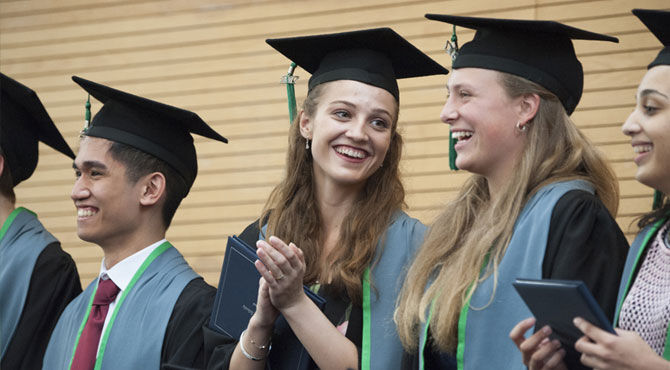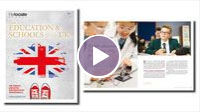Creating an environment that develops students’ confidence
Developing a child’s confidence from a young age is an important part of the nurturing process. International schools such as ACS work hard in developing students confidence throughout their education.

International schools roles in developing confidence
Schools and teachers play an important role in nurturing children’s self-esteem as they learn, which in turn helps them feel confident and achieve the best they can.At an international school such as ACS, which has over 90 different nationalities across the school community, students become comfortably adept at collaborating with their international peers and develop a wider global perspective. Both of these essential skills will give them confidence to explore this increasingly connected world.Many have noted, including Laura Barton of BBC Radio Four’s ‘The Confidence Trick’, that students at independent schools have a deep-rooted sense of self-worth – a developed confidence.But how do schools encourage children to become confident without becoming arrogant? And what about those on the other end of the spectrum, who need a confidence boost?A culture of acceptance
The natural diversity of an international school creates an environment where students of different religions, cultures and nationalities come into contact with each other every day.Within that diversity, many students have travelled and relocated internationally. From this they recognise a shared experience, can identify similar traits, and respect one another, building their own confidence through commonality and diversity. An overly confident or arrogant child might be inclined to believe one experience is better than another, rather than respecting each other’s differences.The culture of tolerance found in international schools allows for students to appreciate their peers’ as individuals with their own talents and gifts. Therefore, there is no need for students to have to prove their worth to be accepted by their peers, reducing arrogance or bragging in the school community.On a more personal level, classes and assemblies at ACS discuss the concepts of failure and resilience. Learning that nobody is perfect encourages students to understand that it’s okay to ask for help and embrace challenges as opportunities. We help students to understand that failing is just as important as succeeding, creating a less competitive, and thus less arrogant environment.Related articles:
- The challenges involved in relocating younger children
- Choosing a boarding school in the UK
- The value of education consultants
The problem with ‘Gifted and Talented’At ACS, to create an environment without arrogance and to allow those with low confidence to develop, we have shunned ‘Gifted and Talented’ programmes. The programme only adds another label to students.Those who are included in the programme have to live up to the expectations it carries, and may see themselves as more valuable to the school community, while those who are not part of the programme may feel neglected or not good enough.Instead, ACS ensures that students who excel or have a special interest in a specific area receive extra encouragement from teachers, just like those who require additional support. This type of student-centred learning provides opportunities for every child, no matter what their talent, skills or difficulties.As part of this approach we have created the lunchtime Challenge and Enrichment Club, aimed at students wanting to explore new subjects and extend learning. The optional club covers a range of interests for students across the board, not just those who are academically bright.If students can be challenged as part of a club, it will lead them to become confident across the whole curriculum. It’s an inclusive way to challenge and enrich all.
Extra-curricular opportunities
In addition to the Challenge and Enrichment Club, all extra-curricular activities can play an important role in developing and maintaining confidence. Not only do schemes like Duke of Edinburgh help build leadership qualities, communication and teamwork, there is also an element of overcoming challenge – again helping to build confidence.A former ACS student, Freddy, benefitted from a holistic approach to education. He achieved a very respectable International Baccalaureate score (34 points) but through his attendance, passion and interest in a variety of extra-curricular activities, he developed a host of complementary skills that helped to make him a confident individual.Freddy has now gone on to study a PhD in aeronautical engineering, something you may not expect of an average grade student, emphasising that a final score result is not always a great indicator of future success. For Freddy it was a combination of tangible and intangible inputs that equipped him with a belief or confidence in his own ability.Stepping outside the comfort zone
Extra-curricular activities also provide an opportunity to push students out of their immediate comfort zone. For example, many ACS students take part in the International School Sports Tournaments, which are often held at participating schools across the globe. During these week-long tournaments, team members will stay with host families from the school host. Often students will not know the host families before their stay, or will have perhaps only corresponded by email or Skype.During the week, host families will take visiting team members to sites of cultural significance, converse in a foreign language and exchange cultural traditions.The situation allows students to engage, live and learn about another culture through a first-hand experience.By stepping out of their comfort zones, students improve the skills learnt in school, such as foreign languages, and engage more deeply with topics covered in class.Most importantly, students understand how to communicate with people from diverse backgrounds, develop a global perspective and an appreciation of varied cultures.These exchanges help students to look out for worldwide opportunities and have the courage to seize them, step through the door and thrive in the world of work. Schools must all aim to develop every students’ natural level of confidence – it’s not all about being the captain of the sports team or taking the starring role in the next school play.By creating an atmosphere of acceptance, schools can help students become quietly and comfortably confident, adaptable and self-assured.This article was written by Tony Eysele, Head of ACS Cobham International School, to find out more about ACS
 Access hundreds of global services and suppliers in our Online Directory
Access hundreds of global services and suppliers in our Online Directory
©2026 Re:locate magazine, published by Profile Locations, Spray Hill, Hastings Road, Lamberhurst, Kent TN3 8JB. All rights reserved. This publication (or any part thereof) may not be reproduced in any form without the prior written permission of Profile Locations. Profile Locations accepts no liability for the accuracy of the contents or any opinions expressed herein.































